It’s Not Just Office Furniture
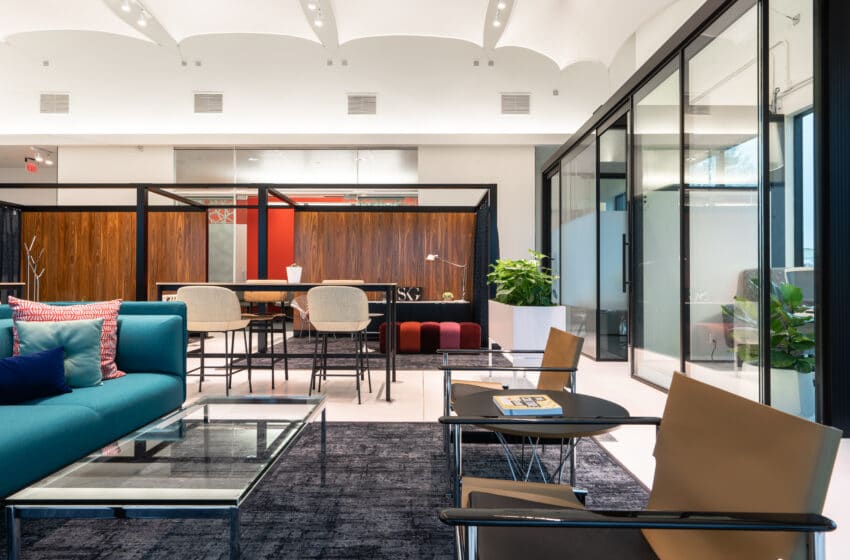
A Conversation with Beth Goff-McMillan, CEO of SKG
For Beth Goff-McMillan, “office furniture” is a lot more than what comes to mind for many people: rolling chairs, a desk, maybe a plant in the corner. Over a career spent in the furnishing industry, she has discovered that outfitting a workspace excellently not only adds aesthetic appeal—it can also become an integral part of an organization’s strategy and culture.
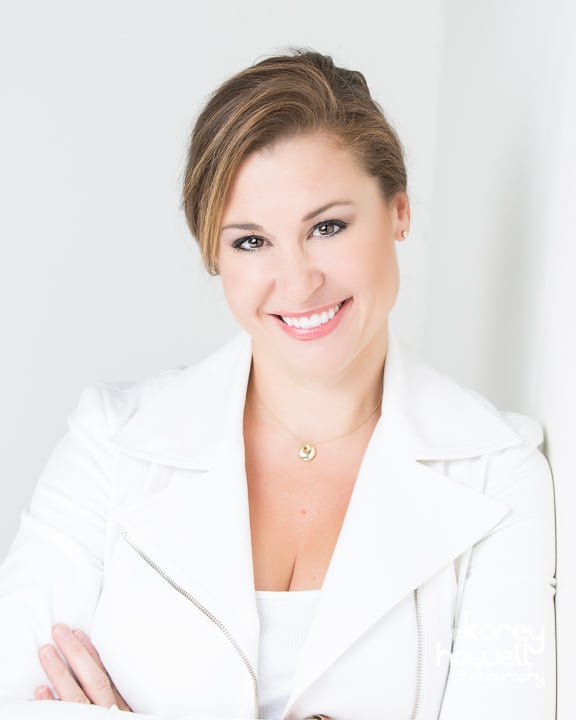
Goff-McMillan has served as CEO of SKG, an Austin-based furniture dealership, since 2015. The firm itself was founded more than 26 years ago, by longtime Texans Ron Shelton and Diana Keller, as Shelton Keller Group. Today, SKG is one of the largest office furniture providers in Texas and the exclusive dealership for Knoll in the Central, South and West Texas, with 250+ other manufacturing partnerships. (Knoll is a storied furniture brand founded in 1938 in New York City; currently, the Museum of Modern Art in New York is home to over 40 of its designs.)
When you get Goff-McMillan talking about workspaces, her passion is clear. Her particular focus is on helping SKG’s customers—whether corporate, healthcare, higher education, or hospitality—to understand the power of well-designed workspaces and to navigate the often confusing process of procuring institutional furniture. We spoke with Goff-McMillan about her path to the CEO role, the difference between selling furniture and solving problems, and much more.
You grew up in Louisville, Kentucky. What brought you to Texas? Any child who grew up watching Dallas wants to move to Texas. So after college, I moved to Dallas with my first husband, right out of college. I thought I would be in Dallas for five years and become a millionaire. That’s what everybody does when they move to Dallas, right?
Dallas was fabulous in terms of raising our kids, doing business. Great restaurants. But I eventually realized that Dallas wasn’t my city. When my feet hit Austin soil, it felt like home. It was so much like Louisville and had that culture I was used to. Moving to Austin really fit our family. We’re outdoorsy and we love music.
Tell me about how you got started in the furniture industry. I’ve spent the majority of my career in it. I started out running sales and distribution for Knoll, which is a global design and furnishings brand. In 2011, I started my first consulting company, Workspace Vision. I wanted to take everything I knew from the distribution and manufacturing side and represent the customer as they furnish their space. I always felt our customers were underrepresented in navigating the what, how, and why of office furnishings.
When I started Workspace Vision, I was a single mom of two young kids. I had a nest egg I planned to use to put a pool in the backyard. Then one day I looked out and I said, “No, I’m going to start my own company. Y’all can go to the country club for the pool!” My mother was terrified for me, but I will bet on a single mom all day long. They know they can’t fail.
What brought you to your current role as CEO of SKG? Around 2015, I received a call saying that SKG was looking for new ownership and a new CEO. It was a highly respected, 20-year-old business, very sound, but they were looking to take over new product categories and markets. That’s when they tapped me to come in and take over. Diana Keller, one of the founders, remains very active as a partner.
And how has it gone so far? Up until COVID, it was fabulous. It was exhilarating to take everything I knew about the furniture industry and apply it to a dealership like SKG. Even seven years ago, when I started, Austin was on a radical boom. We scaled rapidly. It was a ton of fun.
COVID brought a whole new set of challenges. Nowhere did I foresee that offices—corporate, government, hospital, college—would be empty. I’d never experienced anything like it in my life. Our industry slid back about 38 percent in one year. We at SKG slid back about 26 percent, so we fared well by comparison. We definitely had to pivot in some pretty dramatic ways. But we’re bouncing back. You build new muscles in those times.
Tell me about how you pivoted. In the fall of 2019, we were focused on an eCommerce play that helped customers select and buy furnishings online. Once we went into COVID, we doubled down and have been maniacally focused on technology so people could tap our expertise and furnish their space online. Our industry is not driven by technology so it’s very, very different for us. The tools we’ve created recently allow our customers to reimagine their space digitally and at their own pace. Many people don’t want to redo everything right now. They need to test, adapt, repeat.
When we first launched eCommerce, our customers and partners were begging for the ability to click and buy. So we gave them that ability, but nobody gravitated toward it. They would just stare blankly at us and say “Oh, well, we still want you to put the orders together for us. We just want to approve online.” That was an aha moment for us. We dug into the research and realized that our customers want ease of technology, but they want us to do all the risk mitigation and guide them as service partners. It totally made sense. Anybody who’s ever had to buy furniture for an office, campus, or hospital knows it’s complex and scary.
It totally made sense. Anybody who’s ever had to buy furniture for an office, campus, or hospital knows We now begin every project with a six-question about the customer’s business—their concerns, their people, their spaces, timeline, and style. It’s very visually driven, so everybody’s talking the same visual language. Once they answer those questions, it immediately takes them to a dashboard showing their entire project in one view. Then we can do what we do well: plan, design, and mitigate the risk. Yes, at the end they can pay for it online, but we put everything together and the tool keeps everything together in one space.
I think it goes to show that whether you’re pivoting or not, you’ve got to understand the customer’s desires and needs, beyond even what they tell you. As long as I’ve been in this industry, I’ve always been about the customer. I am maniacal about digging in and understanding our customer’s why. If you can’t tell me why a customer needs this, you don’t know the customer.
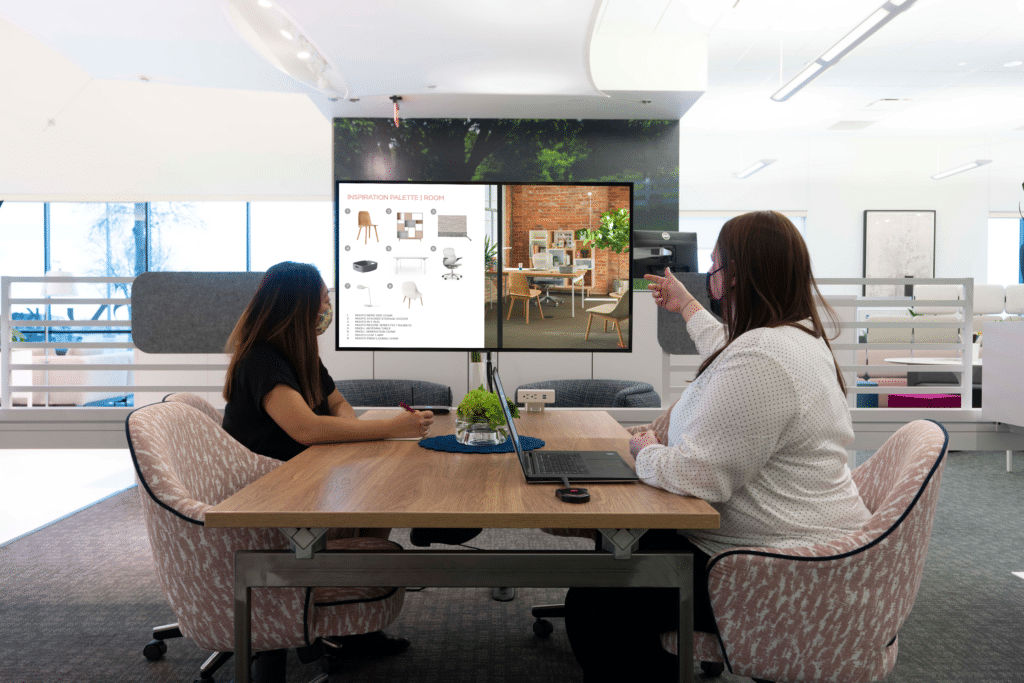
What does that look like in the furnishing industry, especially for clients looking to furnish workspaces? It’s totally not just about furniture. Furniture is where work happens. It’s the connectivity between the human and the work. It reflects your culture and determines how productive people can be. Our mantra has always been: Furnishing is a strategic business tool.
I love human nature. I love to understand what drives people to do the things they do. I think that’s helped in growing businesses. The thing I love more than anything is watching the light bulb go off when a customer sees how rethinking a space can bring a team together and amplify their culture. It’s not about selling. Anybody can sell furniture, but not everybody can solve problems. And that’s all we do: solve our customers problems and help them reach their goals as a business. We feel very strongly that we’re a service company above all. All the way back in my consulting company, I would get to know the customer’s business deeply. I’d take them through visioning sessions, all about their people and their culture and their goals.
Has COVID changed how people think about furnishing workspaces? Prior to COVID, office furnishing felt like a necessary evil for some companies. Any decisions around furnishings were pushed to the very last thing. Now, post-COVID, everybody’s talking about the importance of workspace design. They’re thinking about how we inhabit and connect to workspaces, and how to use them as an advantage in the context of hybrid work. I appreciate those conversations. I’m excited about people valuing the workplace in a different way.
Tell us about SKG’s own culture. It’s a huge focus for us. Right before this call, I was reviewing our quarterly employee survey results on our culture. We report back the findings—good, bad, and ugly—to the entire company. Our culture has changed in some ways, but regardless of our revenue and head count, we see ourselves as a small business. We take what we do very seriously, but we do not take ourselves seriously. We’re quirky, we’re weird—and we love it. And we work incredibly hard.
This sometimes is a controversial topic, but we also feel like we are a family. Some companies don’t believe in that, and I appreciate that standpoint. But very few of the 85 or so people at SKG are truly from Austin. We’re this patchwork quilt of backgrounds and cultures, so we really have to rely on each other, especially in an industry that was dramatically hit by COVID. So we celebrate that we are a family. You don’t always get along with your family. That’s why we bring in outside help, just like a therapist, to make sure we get back on track. We don’t talk bad about our family outside of the house, and we’ll go into battle with our family. We’re not a gigantic tech company with a chef preparing meals, but there are a lot of things we offer that those companies never could.
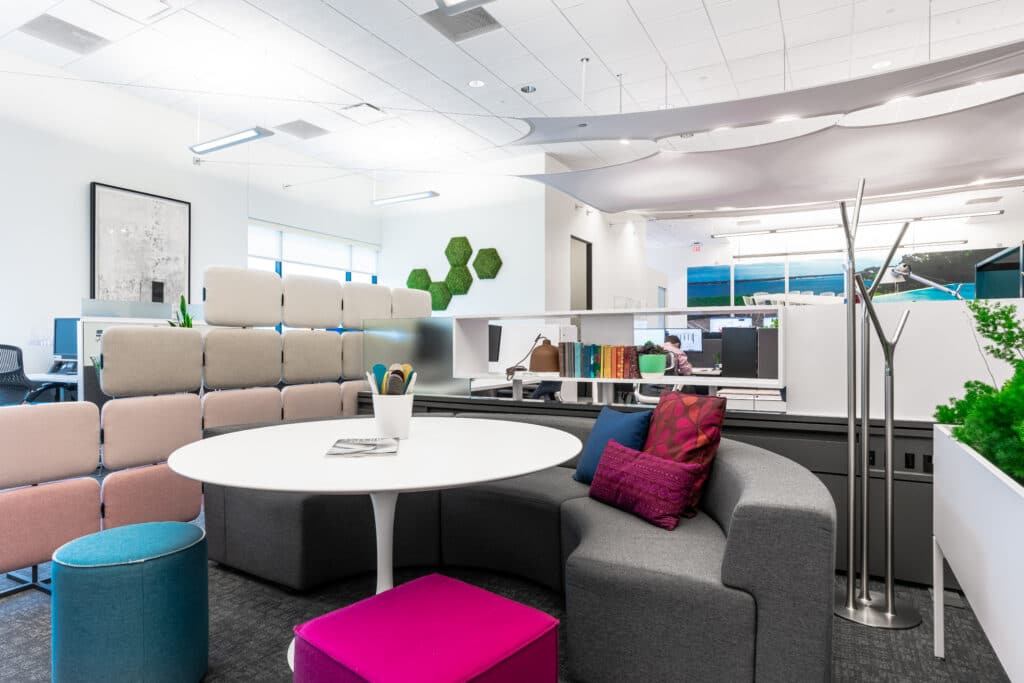
I imagine your workspace is furnished just perfectly. It is stunning. And let me tell you, when we drop below the bar, our employees let us know! We have a warehouse space attached to our showroom in Southeast Austin. We’ve had that for over a dozen years, and we’ll have it for as far as we can see. We felt very strongly that having those facilities attached was critical, not only so customers could see how the furniture was stored and protected, but also so they could have access to warehouse and installation teams. Those folks interact with the customers as much as the front end of the office, so have it all connected was super important to us.
Can you tell us a little about your leadership philosophy? I see two main types of leadership. One is authoritative: I’m the leader because I have the title. The other is inspirational. It doesn’t require a title. I believe very strongly in the latter. I don’t think having a title equals leadership. I see children who are incredible leaders. We work a great deal on leadership in our company. It’s magical when you get to experience great leadership, and it’s devastating when you don’t.
What are your next plans for SKG? World domination, one task at a time! But seriously, I see an incredible opportunity. This past year, Knoll was purchased by Herman Miller. They’ll now be the world’s largest design and furnishings company. We’re excited to be the first dealership they tapped to partner with on a technology product. It’s a thrill to be along for the ride. We’re also focused on our government business—federal, state and local—and on helping healthcare providers. Going in and putting a smile on a healthcare worker’s face just has been incredible.
What has been your biggest career success so far? Supporting our families and community through COVID. I get choked up thinking about it. I’ve never been more proud to be part of an organization. Seeing everybody support each other as spouses were losing their jobs, kids were struggling, people were getting sick. We gave families within the company extra computers because some of them had three or four kids using one computer. Deals come and go, titles come and go, but making an impact on people—that’s the stuff that will stay with you forever.
Have you had any big failures? We could do an entire magazine on those! Nobody gets to the position of CEO without a lot of punches in the face. Especially a woman. One failure stands out probably bigger than most. I had been CEO at SKG for two years, and we had a very talented woman resign. She said, “It’s too hard to work for this company and be a woman.”To this day, that put such an imprint on me. I’d always prided myself on supporting women, but I had lost focus on that. I was so focused on the business and customers and market that I missed the employees. That was a very, very hard lesson to learn. It really shaped how I moved forward.


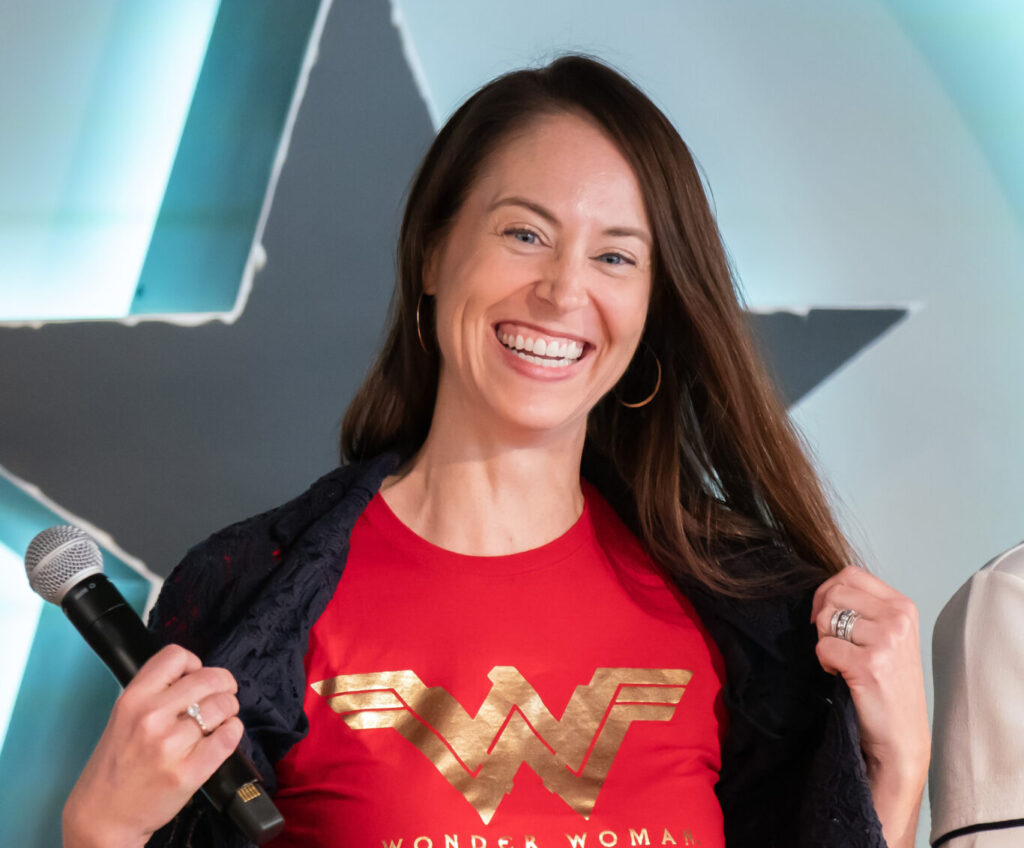
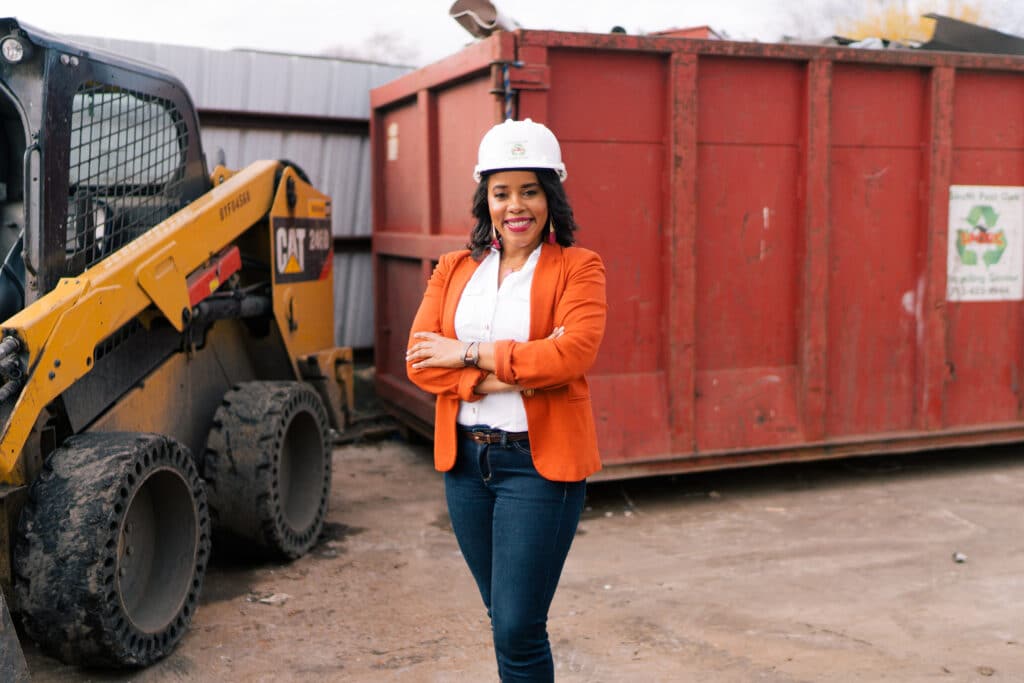
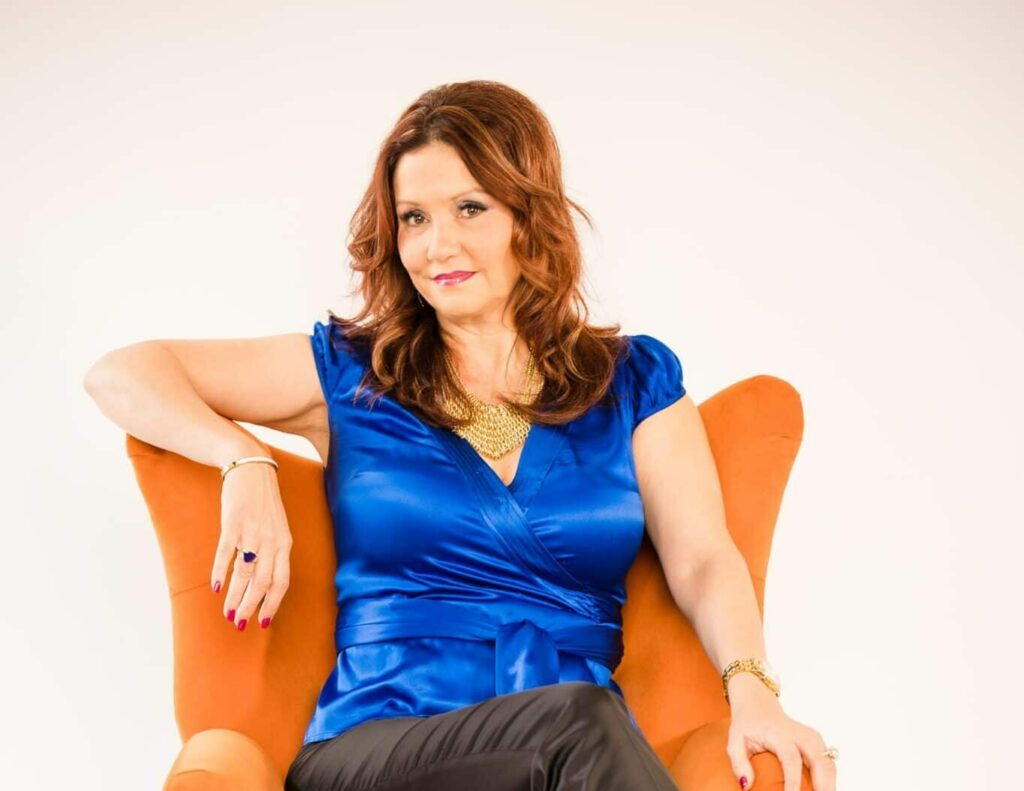


The Sweet Smell of Sucess
April 11, 2023